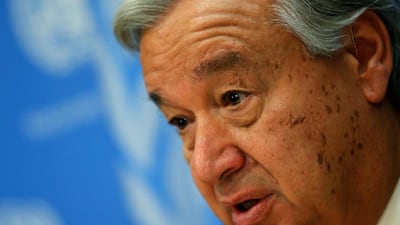At least five women said they were raped by UN staff last year, with dozens more alleged to be victims of sexual abuse or exploitative relationships from which babies were born, according to an annual report released on Monday.
The statistics relate to UN agencies and were documented separately from accusations of misconduct involving peacekeeping and other political or field missions around the world in 2018.
The incidents implicate local and international staff predominantly working for the United Nations High Commission for Refugees (UNHCR), the International Organisation for Migration (IOM), the child rights agency Unicef, and the World Food Programme (WFP).
Dozens of investigations are ongoing and although not all the allegations were substantiated at least two rape victims were aged under 18 at the time. One received counselling and the other required medical assistance, according to the UN.
There were 75 allegations of sexual exploitation or exploitative relationships. At least five women – one aged under 18 – gave birth as a result.
The annual report, titled Sexual exploitation and abuse: implementing a zero tolerance policy, was issued in the name of UN Secretary General Antonio Guterres, and follows publication of a survey in January in which one third of the UN workforce said they had been subjected to sexual harassment.
In his report, Mr Guterres said that the organisation's response to allegations of sexual abuse had been strengthened and more protection was being given to victims and whistle blowers among the UN's 90,000 staff and 100,000 uniformed personnel, but incidents were continuing and damage was being caused.
“They implicate a range of alleged perpetrators, including United Nations and non United Nations personnel, such as staff members on non-governmental organisations that implement our programmes on the ground,” he said.
“This behaviour harms those we serve, undermines the United Nations' values and principles and tarnishes the reputation of the women and men who work with integrity and dedication to realise the objectives of the organisation.”
Thirty-three women were solicited for transactional sex by people from the IOM, UNHCR, Unicef and the WFP, according to the report, which did not detail the countries in which the incidents allegedly took place.
Of 148 allegations made against UN staff and related workers in 2018, 73 are under investigation, 35 have been given a preliminary assessment and 10 have been found to be unsubstantiated. So far, 27 of those cases have been proven and only three incidents have been closed.
Monday's report follows several high-profile accusations against the UN of sexual exploitation and abuse by peacekeepers in Africa in recent years.
Separate figures relating to civilians or contractors working on UN peacekeeping and special political missions showed 13 allegations of sexual misconduct, including eight of rape, against people working in the Central African Republic, the Democratic Republic of the Congo, Uganda, and South Sudan.
At least three people were fired or had their contracts severed following the allegations. Nine investigations were classed as pending.
There were 38 accusations including 11 of rape against military staff in countries such as Burundi, Cameroon, Gabon, Niger and South Africa but almost all of those cases were classed as pending investigation. Those numbers were down on comparable figures reported in 2017 and 2016.
In his report, Mr Guterres said the UN was increasing the steps that aid groups and other organisations it works with, known as implementing partners, had to abide by to eliminate or address incidences of sexual exploitation.
As such, UN managers need to provide annual action plans to address abuse and reduce risk of the same, as well as outline how complaints will be reported and processed while protecting victims, witnesses and family members.
A UN-appointed victims' rights advocate has conducted visits to Haiti, Jordan and Lebanon and four others have been deployed in the DRC, Haiti and South Sudan, according to the report.
But recruitment processes were also highlighted as a past weak spot.
An electronic programme called Clear Check has been designed to screen potential UN staff, personal declarations about past history are required and partner organisations also need to share information about candidates who have past misconduct.
However, the report was called inadequate by Code Blue, a campaign group seeking accountability for abuses committed by UN staff and contractors, as it indicated not one person accused of crimes had been prosecuted or convicted.
“In parts of the UN where reporting has increased, the secretary-general ‘suggests’ without evidence that this indicates greater trust in the system, thanks to staff training and awareness-raising campaigns that ‘led inter alia’ to more victims coming forward,” a spokesman said. “But where decreases in levels of reporting appear, that means that prevention programmes are working. Wherever the data points, the report’s rhetoric can spin it as an achievement.”

